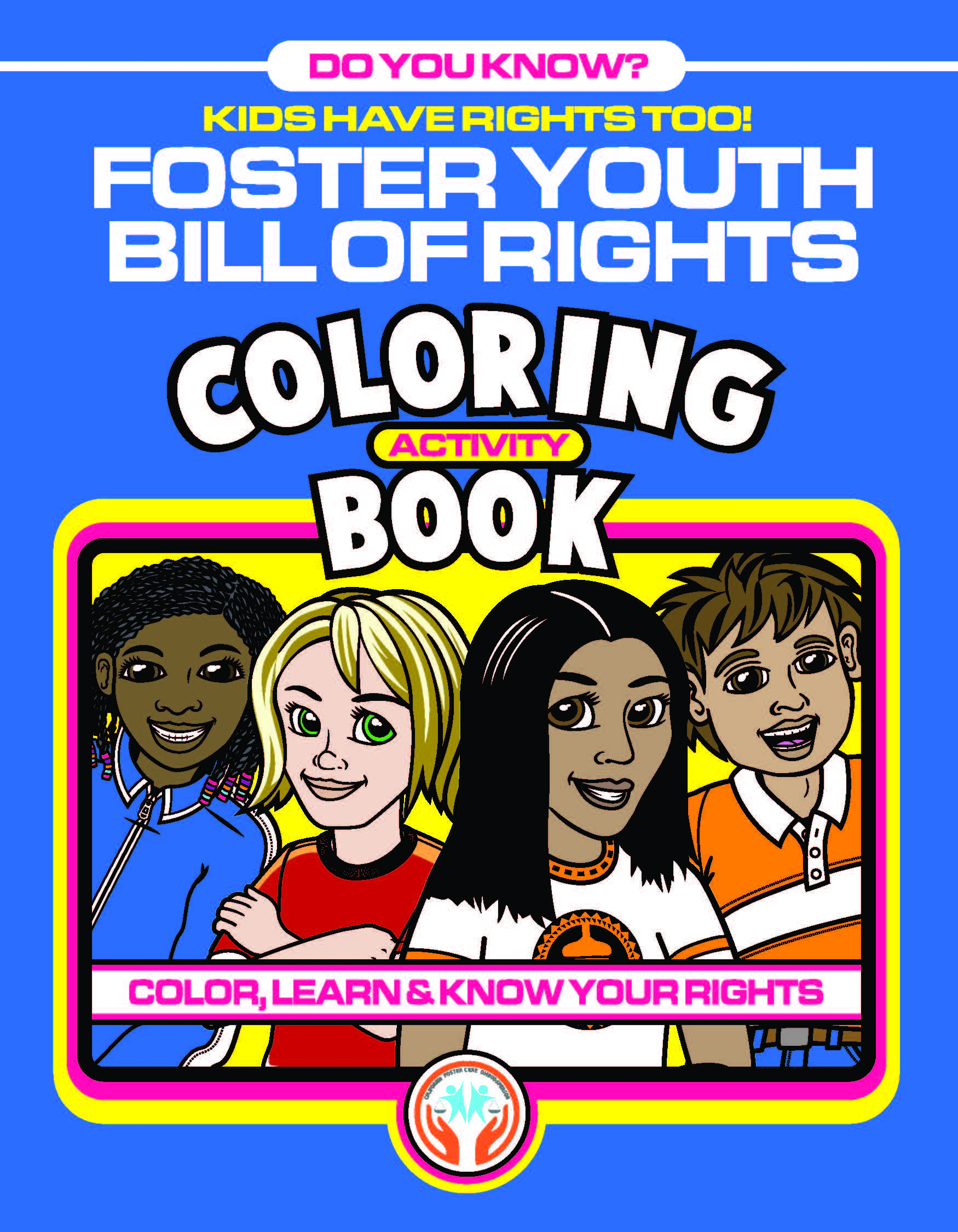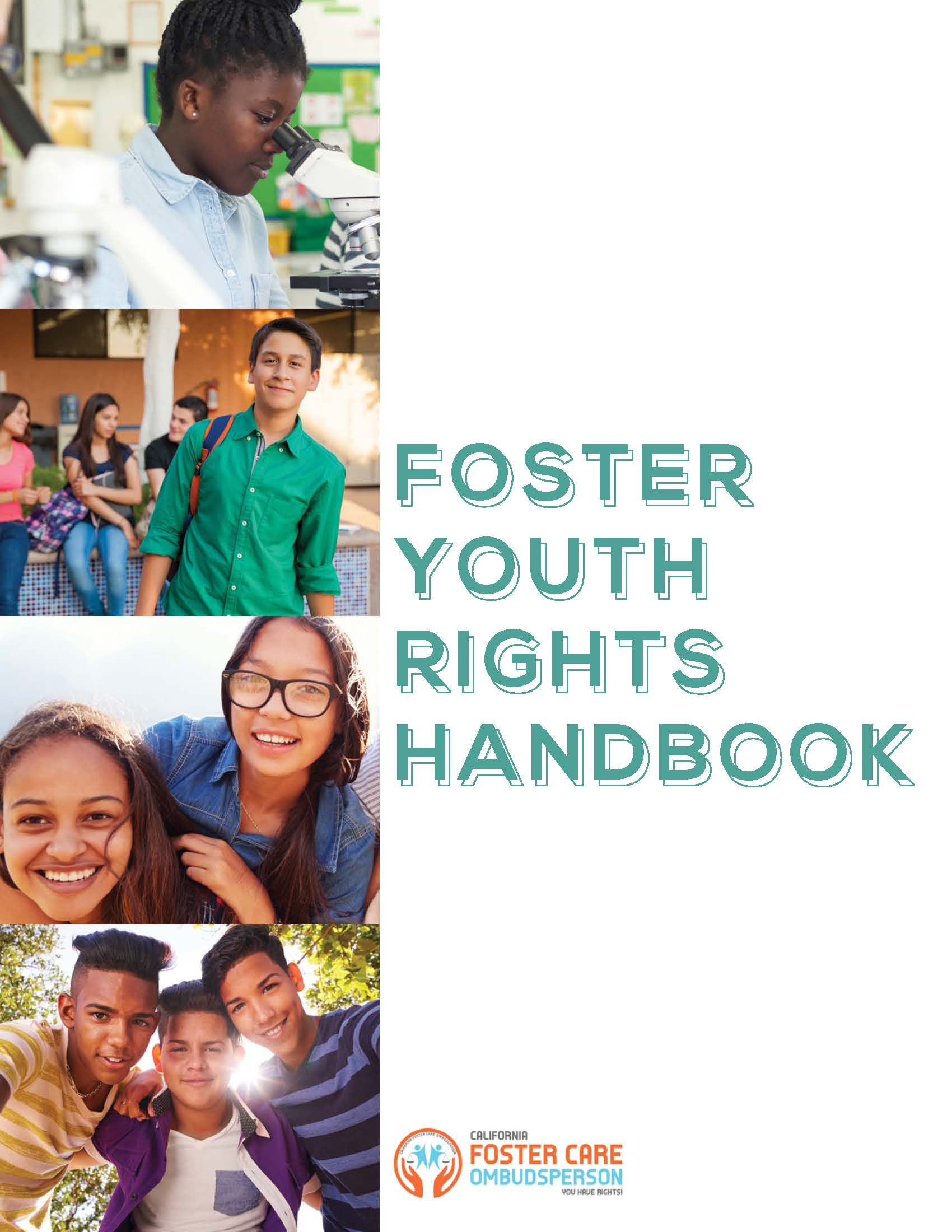Know Your Rights
Download the Foster Youth Bill of Rights
These publications explain the rights that you have while in foster care. You can download digital copies below. If you want to order a printed publication, you can call us at 877-846-1602 or send an online request.
Coloring Book

Printed Spanish Coloring Book out of stock until Winter 2025.
Handbook

Printed Spanish Handbook out of stock until Winter 2025.
Poster

Posters are available in English & Español print versions only.
Wallet Brochure

Wallet accordion brochures available in English & Español print versions only.
Resource List

Does the Foster Youth Bill of Rights apply to me?
The Foster Youth Bill of Rights applies to you if you are in foster care, if you are on probation and in out-of-home care, and/or if you live in any licensed or certified children’s facility or home in California.
Who is supposed to teach me about my rights?
The law says:
- Your social worker (SW) or probation officer (PO) must talk with you about your rights every 6 months and at every placement change
- They must tell you about your rights in a way that’s easy for you to understand
- They must use our office’s publications to explain your rights
- You have a lawyer and their job is to defend your rights
- The people where you live must answer any questions you have about your rights
- If you live in an STRTP, shelter, or home with 6 or more foster youth, a poster of your rights must be visible
What can I do if my rights are being violated?
- Try to remember the event. Writing it down can help.
-
- What happened?
- Where did it happen?
- When did it happen?
- Who was involved?
- What rights were violated?
-
- If you feel safe, try to resolve it with the people who were involved.
- If you feel safe, talk to your caregiver or staff member.
- Contact your social worker/probation officer and lawyer.
- Contact the California Office of the Foster Care Ombudsperson.
Who can I contact if my rights are being violated?
You can contact us at the California Office of the Foster Care Ombudsperson (OFCO)!
An ombudsperson (also called ombudsman) is an impartial, independent person with the authority and responsibility to receive, investigate, and/or informally address and resolve complaints about government actions, and when appropriate, make systemic recommendations based on findings.
The OFCO is a neutral and independent office that helps solve problems and complaints about the care, placement, and services of children and youth in foster care.
![]() 1-877-846-1602
1-877-846-1602![]() fosteryouthhelp@dss.ca.gov
fosteryouthhelp@dss.ca.gov

Remember: You have the right to speak to our office confidentially, and you cannot be threatened, punished or retaliated against for making complaints.
Foster Youth Bill of Rights
![]() Personal Rights
Personal Rights
You have the right to live in a safe, comfortable home where you are treated with respect and to have:
- enough clothes and healthy food
- clothing, grooming, and hygiene products that respect your culture and ethnicity
- a private place to keep your things
- a phone you can use to make private calls (unless a judge says you cannot)
- a caregiver that has special training on trauma and ways to help you
You have the right to:
- go/not go to religious services and activities of your choice
- participate in cultural, racial, ethnic, personal enrichment, and social activities
- fair and equal access to all available foster care services, placements, care, and benefits
No one can:
- lock you in a room or a building (unless you are in a community treatment facility)
- make you stay in juvenile hall because they can’t find you a home
- use law enforcement as a threat or retaliation
- abuse you physically, sexually, emotionally, or exploit you for any reason
- punish you by physically hurting you for any reason
- look through your things unless they have a reasonable or legal reason
- treat you unfairly because of your race, ethnicity, ancestry, national origin, color, religion, sex,
- sexual orientation, gender identity and expression, mental or physical disability, HIV status, or membership in a federally recognized Indian tribe
![]() Indian Child Welfare Act (ICWA)
Indian Child Welfare Act (ICWA)
Are you a member, or could you be a member, of a federally recognized Indian tribe?
You have the right to:
- live in a home or STRTP that maintains the social and cultural standards of your Tribe and tribal community
- live in a home of your relatives or extended family or a home that is licensed, approved, or specified by your Tribe
- live in an Indian foster home that is licensed or approved, or a facility that is approved by your Tribe or an Indian organization that meets your needs
- live in a place that reflects and keeps you connected to the cultural and social standards of your Tribe and/or tribal community
- contact your ICWA advocate and have them attend court
- contact your Tribe, tribal members, and Indian community
- have a social worker/probation officer, and lawyer who is trained in ICWA
- participate in traditional Native American religious practices
- get help becoming a member of an Indian tribe or Alaskan village
- get all the benefits that come from being a member of an Indian tribe or Alaskan village
- be free from discrimination and be recognized for your relationship with an Indian Tribe or Alaskan village
- have protections for your tribal relationship in your case plan
![]() Sexual Orientation, Gender Identity, & Expression (SOGIE)
Sexual Orientation, Gender Identity, & Expression (SOGIE)
You have rights to protect your SOGIE. You have the right to:
- live in a home or STRTP based on your gender identity
- be called by your chosen name and gender pronouns
- see a doctor or counselor who is gender affirming
- have clothing, grooming, and hygiene products that respect your gender identity and expression
- have a caregiver, social worker/probation officer, and lawyer that have been trained on SOGIE and how to care for LGBTQ+ youth
- keep your SOGIE information private
![]() Education
Education
You have school rights. You have the right to:
- go to school every day
- get help with school
- stay at your same school if it’s best for you
- enroll right away at a new school
- get partial credits for all classes you were passing if you change schools
- go to after-school activities
- have priority enrollment in pre-school and after-school programs
- have priority enrollment at California State Universities and community colleges
- access information about college and career education programs
![]() Sexual and Reproductive Health
Sexual and Reproductive Health
You have sexual health rights too. You have the right to:
- get information about your sexual health in a way that you understand
- use or refuse services for birth control, condoms, other types of protection, and pregnancy care, including abortion, without telling an adult
- get healthcare services for sexual assault without telling an adult
- if you are 12 years or older, choose your own doctor or counselor and make decisions about preventing, testing, or treating STIs and HIV without permission from any adult
![]() Mental Health
Mental Health
You have mental health rights too. You have the right to:
- keep your mental health records private
- get gender affirming mental health treatment
- work with your doctor to safely stop taking psychotropic medication
- refuse to take psychotropic medication, and no one can punish you for it
- know about your diagnosis and understand treatment options
- get help with an alcohol or drug problem without permission
- get mental health services in a place that meets your needs
- if you are 12 years or older, choose your own doctor or counselor and make decisions
about your mental health treatment
![]() Health
Health
You have health rights. You have the right to:
- see a doctor, dentist, eye doctor, or talk to a counselor when you need to
- see a doctor who is gender affirming
- refuse to take any medicines, vitamins, or herbs, and no one can punish you for it
- keep your medical records private
- have the risks/benefits of treatment explained to you in a way that is easy to understand
![]() Court
Court
You have rights at court too. You have the right to:
- be told about court hearings in writing
- go to court and talk to the judge
- tell the judge what you want to have happen in your case
- tell the judge how you feel about your psychotropic medications
- ask the judge for visits with your siblings
- request a hearing if you feel like your lawyer is not acting in your best interest
- ask for people to be in the courtroom or ask for people to leave
- keep your court records private (unless the law says otherwise)
- tell the judge how you feel about your family, lawyer, and social worker/probation officer
- a lawyer, separate from your parents and the county
Your lawyer must:
- keep what you tell them private
- have special training on ICWA and SOGIE
- make sure you are safe and have the services and supports you need
- tell the judge what you want to have happen
- answer questions you have about court, foster care, and other laws
![]() Case Plan
Case Plan
You have the right to:
- help create your case plan
- have a case plan within 60 days of being in foster care
- have your case plan updated at least every 6 months
- be told of any changes to your case plan
- get a copy of it if you are age 10 and older
- have your Tribe involved in case plan decisions
Your case plan will have:
- health and education plans
- the best place for you to live
- the services you need
- a long-term plan for where you will live
- gender-affirming healthcare plans
- plans for visitation with your parents and siblings
- transition to independent living plan (TILP), if you are 16 or older
![]() Child and Family Team (CFT)
Child and Family Team (CFT)
You have the right to a CFT. You have the right to:
- request CFT meetings
- have support people at your CFT meeting
- talk about your needs in the CFT meeting
- a CFT meeting within 60 days of entering foster care
- a CFT meeting every 6 months
- a CFT meeting at least every 90 days if you are in an STRTP or in a therapeutic foster home
- a CFT meeting at least every 90 days if you are getting certain types of services
- a CFT meeting when any changes are going to be made to your case plan
![]() Family and Social Connections
Family and Social Connections
You have the right to:
- visit and contact your parents, siblings, and other family members in private (unless a judge says you cannot)
- contact people who are not in the foster care system (like friends, church members, teachers, and others), unless a judge says you cannot
![]()
Preparing for Adulthood &
Money Management
You have the right to do some things on your own. You have the right to:
- have an allowance
- your own bank account (unless your case plan says you cannot)
- learn job skills for your age
- work (unless the law says you are too young)
- earn, save, and manage your money (unless your case plan says you cannot)
- go to Independent Living Program (if you are old enough)
- beginning at age 14, get a credit report every year from 3 major reporting agencies and have help fixing any issues
 Communications
Communications
You have the right to:
- use a phone to make and get confidential (private) calls
- use a computer and the internet
- privately use email, text messages, or other electronic communication
- send and receive unopened mail
These rights can be changed if there is a safety concern. Only a judge can take these away or stop you from communicating with certain people.
You have the right to contact the following people in private, and no one can stop you or punish you for speaking with them:
- your social worker/probation officer
- your lawyer
- service providers
- foster youth advocates and Court Appointed Special Advocates (CASAs)
- Education Rights Holder
- Tribe (if you have one)
- Office of Foster Care Ombudsperson (OFCO)
- Community Care Licensing Division (CCL)
 Records
Records
You have the right to see and get a free copy of the following until you are 26:
- medical records
- child welfare records
- juvenile court records
- educational records
*Remember, your rights are law! The law that explains the Foster Youth Bill of Rights is Welfare and Institutions Code 16001.9.
The California Office of the Foster Care Ombudsperson is dedicated to serving
foster youth in California by investigating and resolving complaints
about foster youth rights, care, placement, and services.
![]() 1-877-846-1602
1-877-846-1602
The law that governs the OFCO is Welfare and Institutions Code (WIC) 16164.

